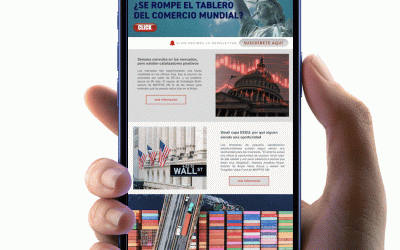“Spanish investors don’t believe in sustainability, while French investors demand it”

Redacción Mapfre
His job title is chief economist at MAPFRE Inversión, but for many months now, Alberto Matellán has been involved in leading the integration of La Financière Responsable (LFR) into the group. In February of this year, MAPFRE announced the acquisition of another 26% of the capital of this small French boutique focused on sustainable investment, of which it had already held 25% since 2017 (before the sustainability boom).
LFR has just over 600 million euros under management and has four funds, but, as Matellán explained to elEconomista.es, its size is not the most important thing. Specifically, the LFR deal has helped MAPFRE get a toehold in France, in addition to being able to use an advanced methodology for their ESG mutual funds.
- What has the process been like since you took a stake in LFR six years ago?
In 2017 we started working together, but it wasn't until the summer of 2022 that I went to France to deal with the purchase of the second tranche to take us to 51% and full control and, from there, to integrate it. It’s a very small company, with more than 500 million euros under management and a team of 15 people. Integrations always take their toll, but we’re very interested in doing it properly, because we want LFR, with its unique know-how on sustainability, to feed into the whole MAPFRE group. And in parallel, we want to break into the French funds market, which is very complicated and very different from the Spanish one.
- To what extent will France be important for MAPFRE?
In terms of revenue, France’s contribution will be small for the time being. But what interests us is the qualitative part. MAPFRE already has some modest reinsurance business in France, but we’d been lacking in the financial business, which will now get a boost. Starting in 2024, we’re going to try to grow more in selling funds across the border. When I say grow more, that growth is important to us as a business, but it’s very small compared to the group as a whole. We’re talking about MAPFRE having approximately 25 billion euros in revenue. The step we’ve taken in France is a small one, but significant nonetheless, when you consider the complexity of this market there.
- Why is it so complex?
First off, if you’re not French, the French regulator is very tough. Secondly, it’s a tremendously fragmented market compared to Spain, with several thousand asset managers, in addition to a lot of bank and insurance channel distribution. There are also a large number of small independent managers, whereas in Spain, there’s hardly a dozen. Also, in France, fund-purchasing platforms only work at institutional level, so retail investors have to buy their funds through intermediaries. And on top of all that, there’s a lot of competition: the French government incentivizes certain forms of saving that are very attractive to medium-low level investors, with products like Livret A for example, a demand savings account that’s paying 3% right now.
- If this market is so difficult, why do you want to be there?
Because we believe there is a great opportunity for MAPFRE in France. The French institutional investor is ahead of us in terms of ESG. There, almost all clients, both retail and institutional, take sustainable investing much more seriously than here. I'm not beating on Spain here, by any means, but here my experience tells me that the client doesn't believe in it, at all. And in France, it’s not a question of whether they believe in it or not, they demand that you prove it. I’m talking about at institutional level here, but you see it at retail level too, who all transact through an asset manager, and they work hard on sustainability.
- In May 2023, MAPFRE announced that it was leaving the Net Zero Insurance Alliance (NZIA). Why have signatories to this ESG initiative promoted by the United Nations opted our of the alliance?
Well, the first thing to say is that our sustainability team could probably answer this question much better than me. I can only talk about the investment part. The truth is that the initiative came in for a lot of criticism on a few fronts. Net Zero has a calculation problem. To make investments, we are, quite reasonably, required to draw up a series of climate scenarios, and our portfolios should be aiming to reduce carbon emissions, so that scenarios meet future temperature increase standards. The problem is that when we begin to make these calculations [relating to possible climate scenarios], the results show immense variations depending on which data sources we use. As investors, we saw that these calculations weren’t sound.
- Would you consider returning if the conditions changed?
If a renewed Net Zero alliance arises that we think works correctly and the entire sector sees it to work, then sure, why not? I think that leaving a movement like this one, if justified, isn’t a problem, as long as it doesn’t impact on our original commitment, which is to do things properly.
- Are the ESG funds in each investment house going to keep their original names or will they be integrated?
The idea is to gradually integrate everything. In 2017 [when MAPFRE first took a stake in LFR], the sustainable investment boom wasn’t a boom at all. At that time, MAPFRE, which as an asset owner itself manages its own investments as well as third-party investment funds, felt that it was important to invest responsibly in both roles, that is, both with our own investments and those of our clients. At that time, the strategy of starting on our own was proposed, but that is a long and heavy path, so we started to see what was on the market as well. Fast forward to 2023 and we have a team in Madrid that makes general investments (within which all responsible investment techniques are being implemented), and another, hyper-specialized team in France, which, as I said, will feed into the entire group. You said before that LFR manages assets of less than 600 million euros.
- What’s the volume like for MAPFRE as a whole?
Approximately 10 billion in products for clients, while total volume, including Group companies, exceeds 30 billion.



